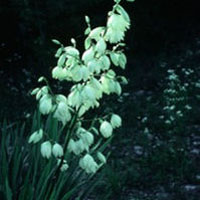Yucca
 © Steven Foster
© Steven FosterParts Used & Where Grown
This desert tree grows primarily in the southwestern United States and is related to the Joshua tree. The stalk and root are both used in herbal medicine.
- Reliable and relatively consistent scientific data showing a substantial health benefit.
- Contradictory, insufficient, or preliminary studies suggesting a health benefit or minimal health benefit.
- For an herb, supported by traditional use but minimal or no scientific evidence. For a supplement, little scientific support.
Our proprietary “Star-Rating” system was developed to help you easily understand the amount of scientific support behind each supplement in relation to a specific health condition. While there is no way to predict whether a vitamin, mineral, or herb will successfully treat or prevent associated health conditions, our unique ratings tell you how well these supplements are understood by the medical community, and whether studies have found them to be effective for other people.
For over a decade, our team has combed through thousands of research articles published in reputable journals. To help you make educated decisions, and to better understand controversial or confusing supplements, our medical experts have digested the science into these three easy-to-follow ratings. We hope this provides you with a helpful resource to make informed decisions towards your health and well-being.
This supplement has been used in connection with the following health conditions:
| Used for | Amount | Why |
|---|---|---|
Osteoarthritis | Refer to label instructions | Yucca contains saponins, which appear to block the release of toxins from the intestines that inhibit normal cartilage formation. In doing so, yucca may reduce osteoarthritis symptoms. |
Rheumatoid Arthritis | Refer to label instructions | Yucca, a traditional remedy, is a desert plant that contains soap-like components known as saponins. Yucca tea is often drunk for relief of rheumatoid arthritis symptoms. |
Traditional Use (May Not Be Supported by Scientific Studies)
Native Americans used the soapy leaves from yucca for numerous conditions. Poultices or baths were used for skin sores and other diseases as well as for sprains. Inflammation of all sorts, including joint inflammations and bleeding, were also treated with yucca. It is also reported that Native Americans washed their hair with yucca to fight dandruff and hair loss.
Copyright © 2026 TraceGains, Inc. All rights reserved.
Learn more about TraceGains, the company.
The information presented by TraceGains is for informational purposes only. It is based on scientific studies (human, animal, or in vitro), clinical experience, or traditional usage as cited in each article. The results reported may not necessarily occur in all individuals. Self-treatment is not recommended for life-threatening conditions that require medical treatment under a doctor's care. For many of the conditions discussed, treatment with prescription or over the counter medication is also available. Consult your doctor, practitioner, and/or pharmacist for any health problem and before using any supplements or before making any changes in prescribed medications. Information expires December 2026.
